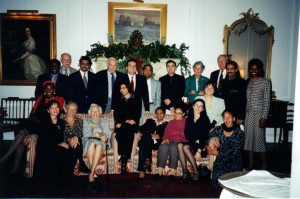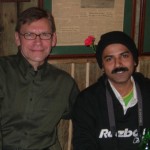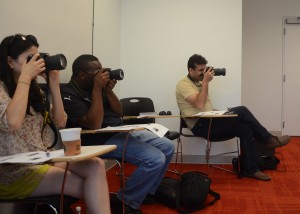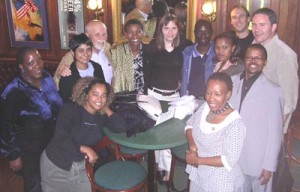A Program Evolves
The Program Evolves Step by Step
Over its 35-year history, the Alfred Friendly Fellowships have sought to improve the experience for our fellows, for the international newsrooms that send them and for the U.S. newsrooms that host them.
It began with the simple premise that journalists are pretty much alike all over the world. So the goal was to let aspiring reporters from developing nations work in print newsrooms in the U.S. for six months. With guidance from their hosts, the reporters were to “learn how we do it here” and apply the lessons learned when they went home.
For that first decade, it worked pretty well. The fellows were self-selecting strivers who could generally adapt quickly to their new surroundings and become contributors to the daily news process.
Ethics Training
But it also became clear that many of the fellows had to struggle because they did not always have a firm grounding in newsroom practices, particularly in some ethical issues. To meet this need, the program developed its Newsroom 101 program, a week of intensive journalist training and media skills courses before the fellows went to their host newsrooms.
Mentoring the Mentors
It also turned out that fellows did best when they could develop close ties with a “mentor,” usually an editor who could acquaint them with the practices specific to the host newsroom.
New Curriculum
In its first decade, an advisory board made up primarily of Friendly family members and representatives of host newsrooms selected our fellows from scores and then hundreds of applicants. In the last decade that board has become more active in defining what skills and practices fellows need to learn. A “curriculum” came together when the fellows mid-term meeting expanded into a week-long formal learning session – first at the Poynter Institute in St. Petersburg, Fla., and now at the University of Missouri in Columbia.
Fellows learned how to write more effectively, how to use Internet research tools, how to shoot and edit video and how to incorporate news ethics and other important skills. And, responding to a frustration voiced by past fellows, they were taught in how to share what they had learned when they went home.
Setting a New Course
For the first two decades, Jean Friendly served as the head of the foundation board, which included her five children and some of their offspring as well. Alfred Jr. provided the day-to-day supervision, working closely with executive directors David Nalle, Susan Talalay, John Sirek and Susan Albrecht. His brother Jonathan took over those duties in 2003 and led the successful effort to remake the board with professionals from various disciplines.
In 2004, after 20 years of continuous operation, the program was halted for a year while Jonathan Friendly and Susan Albrecht travelled around the globe to meet with past Fellows and study how the developing world’s newsroom needs had changed since the program’s inception.
After visiting 50 alumni, potential applicants and newsroom executives in Beijing, Guangzhou, Hong Kong, Istanbul, Johannesburg, Lagos and New Delhi, they returned convinced of the need for a new program model, one that relies on long-term relationships with the international home newsrooms and one that recognizes how American newsrooms have changed with falling revenues and the addition of new digital media outlets. Randy Smith became Executive Director and President of the Board in 2013.
New Partnerships
Symbolic of the new direction is the partnership forged with the family of Daniel Pearl, the Wall Street Journal reporter slain in Pakistan in 2001. Two Pearl Fellows are selected each year in collaboration with the Pearl family; one comes from Pakistan and the other from a different Moslem country.
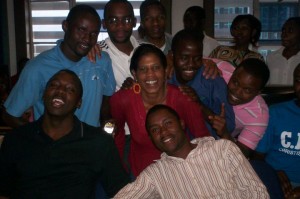
Mara Williams (center) of The Kansas City Star works with journalists from the Nation Media Group in Nairobi.
Another new partnership, this one with the National Media Group headquartered in Nairobi, has fellows chosen by their editors in Kenya and Uganda. The editors know the skills they want their Friendly fellows to learn in the U.S. and bring back to their newsrooms. Randy Smith and four other Kansas City Star staffers have served as trainers for National Media newsrooms in Kenya and Uganda.
In-Country Training
In 2004, alumni told us they wanted more in-country training, so the program sent Greg Victor from Pittsburgh to Bangladesh and sent John Ensslin from Denver to Cambodia for in-newsroom sessions.
Similar partnerships have begun with Korea’s premiere business news magazine, Money Today, and with the English-language China Today news service. The program also arranged and conducted journalism seminars in Beijing, Istanbul, and New Delhi for AFPF alumni and local journalists.
Funding
The foundation board also decided that it would also open the door for U.S. government support, a move that former Fellows assured us would not cast suspicion on the program. In 2011, the Friendly Fellows led a five-day training session in conflict-affected regions of Pakistan, working with the Pakistan Press Foundation, our local partner, and the American Embassy in Islamabad.
Moving Forward
With a new foundation board, a revitalized professional advisory board, a new executive director and a new program name – the Alfred Friendly Press Partners – the program will continue to seek new challenges while hewing to its initial inspiration as a bridge between journalists in the developing world and the United States.

